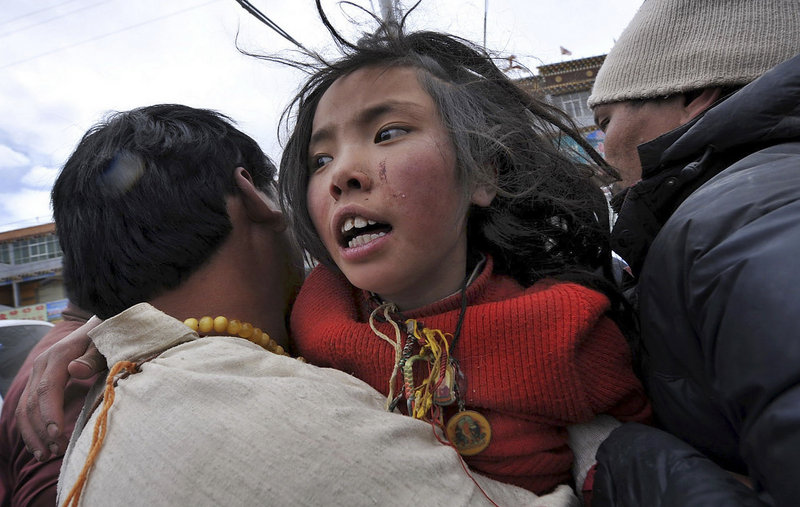JIEGU, China – Tibetan monks prayed Friday over hundreds of bodies at a makeshift morgue next to their monastery after powerful earthquakes destroyed the remote mountain town of Jiegu in western China and left at least 1,144 people dead.
State media on Friday reported that another 417 people remain missing — as rescuers neared the end of the 72-hour period viewed as best for finding people alive. They continued to dig for survivors in the rubble, often by hand.
The official toll was likely to climb further. Gerlai Tenzing, a red-robed monk from the Jiegu Monastery, estimated that about 1,000 bodies had been brought to a hillside clearing in the shadow of the monastery. He said a precise count was difficult because bodies continued to trickle in and some had already been taken away by family members.
Hundreds of the bodies were being prepared for a mass cremation this morning. Genqiu, a 22-year-old monk, said it was impossible to perform traditional sky burials for all. Tibetan sky burials involve chopping a body into pieces and leaving it on a platform to be devoured by vultures.
“The vultures can’t eat them all,” said Genqiu, who like many Tibetans goes by one name.
China Central Television reported that a 13-year-old Tibetan girl was pulled from the toppled two-story Minzu Hotel on Friday after a sniffer dog alerted rescuers to her location. The girl, identified as Changli Maomu, was freed after a crane lifted a large concrete block out of the rubble, it said. Her condition was good and she was taken to a medical station for treatment, it said.
Relief workers have estimated that 70 percent to 90 percent of the town’s wood-and-mud houses collapsed when the earthquakes hit Yushu county, in the western province of Qinghai, Wednesday morning. The strongest of the quakes was measured at magnitude 6.9 by the U.S. Geological Survey and 7.1 by China’s earthquake administration.
Xinhua reported that as of Friday evening the confirmed death toll had risen to 1,144, up from 791 in the afternoon. It said 11,477 people were injured, 1,174 severely.
Rescue spokesman Xia Xueping was cited as saying they now had more heavy equipment available — speeding up the process of recovering the dead.
Many survivors shivered through a third night outdoors as they waited for tents to arrive. Hundreds gathered on a plaza around a 50-foot tall statue of the mythical Tibetan King Gesar, wrapped in blankets taken from shattered homes.
Police had to intervene Friday to prevent young men from grabbing tents out of the back of a truck.
“I saw trucks almost attacked by local people because of the lack of food and shelter,” said Pierre Deve, a program director at the Yushu-based community development organization Snowland Service Group. “It started yesterday, but you still see some things like this today. It’s getting better. Chinese authorities are doing well.”
Nonetheless, Deve said his group, which plans to distribute food, medicine, tents, clothes and bedding, was moving out of Jiegu in case things got worse.
“We want to have a place out of the city where we can communicate in a good way, protect the things we need to give to people who need them,” he said.
China Central Television reported that about 40,000 tents would be in place by today, enough to accommodate all survivors.
Send questions/comments to the editors.



Success. Please wait for the page to reload. If the page does not reload within 5 seconds, please refresh the page.
Enter your email and password to access comments.
Hi, to comment on stories you must . This profile is in addition to your subscription and website login.
Already have a commenting profile? .
Invalid username/password.
Please check your email to confirm and complete your registration.
Only subscribers are eligible to post comments. Please subscribe or login first for digital access. Here’s why.
Use the form below to reset your password. When you've submitted your account email, we will send an email with a reset code.